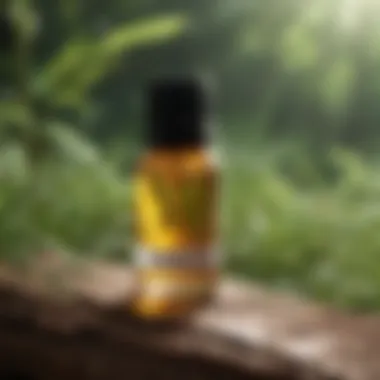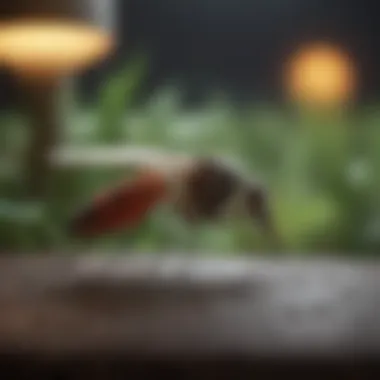Expert Strategies for Mosquito Repellent and Skin Protection Outdoors


Introduction
In the realm of outdoor activities, the pesky presence of mosquitoes can quickly turn a pleasant experience into an itchy nightmare. Discover effective strategies to repel these buzzing nuisances and safeguard your skin. This article delves into practical tips and natural repellents, offering a comprehensive guide to enjoying the great outdoors without the annoyance of mosquito bites.
Understanding Mosquito Behavior
Before delving into repellent strategies, it's essential to grasp the behavior of mosquitoes. These insects are attracted to the carbon dioxide in our breath, body heat, and certain fragrances. Understanding what lures them can help in implementing effective repellent techniques.
Natural Repellents
Harnessing the power of nature, several substances act as natural repellents against mosquitoes. Essential oils like citronella, lavender, and eucalyptus offer a fragrant barrier, while plants such as marigolds and lemongrass can help ward off these pests. Integrating these natural solutions into your outdoor routine can significantly reduce mosquito interactions.
Protective Clothing
One practical approach to deter mosquitoes is through clothing choices. Opt for light-colored, loose-fitting garments to minimize skin exposure. Additionally, clothing treated with permethrin provides an extra layer of protection. By covering up exposed areas, you create a physical barrier between your skin and mosquitoes.
Environmental Modifications
Making simple changes to your outdoor environment can discourage mosquito breeding. Regularly emptying standing water containers, trimming overgrown shrubbery, and installing screens on windows and doors are effective measures. By reducing mosquito breeding grounds and entry points into your living spaces, you can create a less hospitable environment for these insects.
Conclusion
By combining practical strategies, natural repellents, and protective measures, you can enjoy outdoor activities free from the irritations caused by mosquitoes. Implementing these tactics not only shields your skin from bites but also enhances your outdoor experience by allowing you to focus on the beauty of nature. Embrace these strategies to repel mosquitoes effectively and make the most of your outdoor adventures.
Understanding Mosquito Behavior
Mosquito behavior is a crucial aspect to consider when aiming to repel these pesky insects and safeguard your skin outdoors. Understanding what attracts mosquitoes can help you implement effective strategies to keep them at bay. By delving into factors such as body heat and sweat, carbon dioxide emission, and even the choice of clothing colors, you can arm yourself with the knowledge needed to protect yourself from potential mosquito bites. Factors attracting mosquitoes play a significant role in the efficacy of repellent methods.
Factors Attracting Mosquitoes
Body Heat and Sweat
Body heat and sweat are key factors that attract mosquitoes to human hosts. The warmth and moisture produced by our bodies act as beacons for mosquitoes seeking a blood meal. This makes body heat and sweat a prime target for these insects. While this may seem unavoidable in outdoor settings, being aware of this attraction can help you take proactive measures to mitigate the risk of mosquito bites. However, it's essential to understand that completely eliminating body heat and sweat is neither feasible nor recommended, as they are natural processes vital for our bodies' functioning.
Carbon Dioxide Emission
Carbon dioxide emission is another significant factor that draws mosquitoes towards individuals. When we exhale, we release carbon dioxide, which mosquitoes can detect from a distance. This odor cue guides mosquitoes to potential hosts, making them more susceptible to mosquito bites. While it is impossible to cease breathing to avoid attracting mosquitoes, understanding this mechanism can assist in devising effective repellent strategies to counteract this attraction.
Dark Clothing
Wearing dark-colored clothing can inadvertently make you more appealing to mosquitoes. Dark shades absorb and retain heat, making individuals wearing them stand out to mosquitoes seeking warmth. Opting for light-colored clothing can help minimize this attraction, as lighter hues reflect sunlight and heat. Making conscientious choices in your attire while outdoors can play a role in deterring mosquitoes from close contact.
Common Mosquito-Borne Diseases
Malaria


Malaria is a prevalent mosquito-borne disease that poses a significant health risk to individuals in affected regions. The transmission of malaria occurs through the bite of an infected mosquito, leading to symptoms such as fever, chills, and fatigue. Understanding the prevalence and impact of malaria underscores the importance of adopting preventive measures to combat mosquito populations and reduce the risk of infection.
Dengue Fever
Dengue fever is another mosquito-borne illness that can cause severe symptoms in individuals infected with the virus. Characterized by high fever, muscle pains, and rash, dengue fever can escalate into a life-threatening condition if left untreated. Awareness of the symptoms and transmission of dengue fever is crucial in implementing protective strategies against mosquito bites and disease transmission.
West Nile Virus
The West Nile virus is a mosquito-borne disease that has been increasingly reported in various regions. Symptoms of West Nile virus infection can range from mild flu-like symptoms to severe neurological complications. Understanding the prevalence and distribution of the West Nile virus enhances the necessity of effective mosquito control measures to minimize the risk of infection and prevent potential outbreaks.
Effective Repellent Strategies
Effective Repellent Strategies play a paramount role in safeguarding oneself from pesky mosquitoes and their inevitable bites. The significance of utilizing repellents lies in their ability to create a protective barrier, shielding against potential vector-borne diseases. When venturing outdoors, especially in areas prone to mosquito activity, having a robust repellent strategy becomes indispensable. By incorporating a combination of natural and chemical repellents, individuals can fortify their defense, ensuring a more pleasant outdoor experience devoid of constant swatting and discomfort.
Natural Repellents
Citronella Oil
Citronella Oil emerges as a stalwart in the realm of natural mosquito repellents, heralded for its potent fragrance that acts as a deterrent to these winged nuisances. Its distinct aroma not only masks the human scent but also interferes with mosquitoes' ability to locate their prey. A key characteristic of Citronella Oil is its efficacy in repelling mosquitoes without resorting to harsh chemicals, making it a preferred choice for individuals seeking a gentler approach to insect protection. Despite its efficacy, Citronella Oil may require more frequent reapplication compared to chemical repellents, underscoring a minor inconvenience in exchange for a natural defense mechanism.
Lavender
Lavender, known for its calming scent in aromatherapy, also boasts mosquito-repelling properties, adding a multi-faceted benefit to its aromatic allure. The key characteristic of Lavender lies in its dual functionality, harmonizing relaxation with insect deterrence. Its subtle yet pervasive scent serves as a natural barrier against mosquitoes, offering a pleasant fragrance while keeping these pests at bay. Opting for Lavender as a natural repellent enhances the overall outdoor experience, blending protection with sensory delight. However, Lavender's efficacy may vary depending on the concentration and application method, requiring vigilance in ensuring thorough coverage.
Eucalyptus
Eucalyptus, renowned for its diverse applications in aromatherapy and medicinal remedies, emerges as a formidable contender in the realm of natural mosquito repellents. The key characteristic of Eucalyptus lies in its active compound, eucalyptol, which exhibits pronounced insect-repelling properties. Its refreshing aroma not only acts as a deterrent to mosquitoes but also imparts a cooling sensation, providing dual benefits to outdoor enthusiasts. Choosing Eucalyptus as a repellent aligns with a preference for botanical solutions, harnessing nature's intrinsic defenses. Nonetheless, individuals with respiratory sensitivities should approach Eucalyptus with caution, considering its potent fragrance and potential side effects.
Chemical Repellents
DEET
Moving on to chemical repellents, DEET stands out as a stalwart defense against mosquitoes, offering long-lasting protection in environments teeming with these blood-thirsty insects. The key characteristic of DEET lies in its efficacy in repelling various species of mosquitoes, including those carrying dangerous pathogens. DEET's wide-ranging utility positions it as a go-to choice for individuals prioritizing comprehensive insect protection. Despite its proven effectiveness, some individuals may exhibit sensitivity to DEET, necessitating cautious application and adherence to recommended usage guidelines.
Picaridin
Picaridin, a synthetic compound gaining prominence in the realm of mosquito repellents, presents a viable alternative to DEET, catering to individuals seeking odorless and non-greasy protection. The key characteristic of Picaridin lies in its ability to deter mosquitoes without the characteristic strong odor associated with traditional repellents. Opting for Picaridin offers a more pleasant olfactory experience while ensuring robust insect protection, making it a preferred choice for those averse to potent scents. However, reapplication frequency may be higher compared to DEET, requiring meticulous attention to maintain continuous coverage.
IR3535
IR3535, a versatile repellent renowned for its safety profile and gentle formulation, emerges as a favored option for individuals prioritizing skin health and environmental consciousness. The key characteristic of IR3535 lies in its mild yet effective nature, providing adequate protection against mosquitoes without harsh side effects. Choosing IR3535 reflects a preference for eco-friendly repellents that strike a balance between efficacy and skin sensitivity. While IR3535 offers a gentler alternative to traditional chemical repellents, its potency may necessitate more frequent reapplication to ensure uninterrupted protection.
Repellent Clothing
Permethrin-Treated Clothes
When considering repellent clothing, Permethrin-treated garments take center stage as a proactive defense against mosquito bites, offering long-lasting protection with minimal effort. The key characteristic of Permethrin-treated clothes lies in their ability to repel mosquitoes on contact, creating a protective shield that complements topical repellents. Opting for Permethrin-treated clothing provides a comprehensive approach to insect protection, reducing reliance on frequent reapplication of traditional repellents. While Permethrin offers sustained efficacy, individuals should adhere to care instructions to maintain its repellent properties over time.


Long-Sleeved Shirts
Embracing long-sleeved shirts as a form of repellent clothing proves instrumental in minimizing exposed skin surface, reducing the likelihood of mosquito bites during outdoor activities. The key characteristic of long-sleeved shirts lies in their ability to create a physical barrier between the skin and mosquitoes, offering added protection beyond topical repellents. Choosing long-sleeved shirts enhances overall coverage, particularly during peak mosquito activity, ensuring comprehensive defense against insect bites. However, individuals should prioritize lightweight and breathable fabrics to mitigate discomfort in warmer climates while reaping the benefits of enhanced protection.
Light-Colored Clothing
Light-colored clothing emerges as a strategic choice in mosquito-infested areas, capitalizing on mosquitoes' attraction to dark hues. The key characteristic of light-colored clothing lies in its ability to deflect heat and sunlight while minimizing visual appeal to mosquitoes, deterring these insects from landing on the fabric. Opting for light-colored attire complements repellent strategies, reducing the likelihood of mosquito bites and enhancing outdoor comfort. While light-colored clothing offers a tactical advantage in insect prevention, individuals should balance color choices with fabric breathability to ensure comfort and functionality during outdoor excursions.
Home Remedies and Precautionary Measures
Home remedies and precautionary measures play a significant role in mitigating mosquito nuisances and safeguarding individuals from potential diseases. Among the various strategies outlined in this article, focusing on practical and natural solutions is essential for a holistic approach to outdoor protection. By incorporating preventative measures and utilizing the benefits of home remedies, individuals can create a conducive environment that deters mosquitoes effectively. It is crucial to understand the principles behind these remedies and how they contribute to repelling mosquitoes and safeguarding skin health.
Mosquito-Repelling Plants
Citronella
Citronella, known for its potent aroma that repels mosquitoes, is a key component in natural mosquito control. Its strong fragrance masks other scents that attract mosquitoes, making it an effective choice for outdoor areas. The citronella plant is a popular option due to its ease of cultivation and versatile application in candles, oils, and sprays. While citronella offers a natural and pleasant aroma, some individuals may find its scent overwhelming. Understanding the unique properties of citronella and its role in repelling mosquitoes is essential for maximizing its benefits in outdoor settings.
Basil
Basil, another mosquito-repelling plant, emits a fragrance that mosquitoes find repellent. This herb is not only a culinary delight but also serves as a natural deterrent against mosquitoes. Basil plants are easy to grow and maintain, making them a practical choice for home gardens or landscapes. Incorporating basil in outdoor areas can help reduce mosquito populations and provide a refreshing aroma. However, it is important to note that while basil is effective in repelling mosquitoes, its potency may vary depending on various factors like plant health and environmental conditions.
Lemon Balm
Lemon balm, with its citrus-like scent, acts as a natural mosquito repellent and offers a host of benefits. This plant is a versatile option for deterring mosquitoes while adding a touch of freshness to outdoor spaces. Lemon balm is simple to cultivate and can thrive in different environments, making it a popular choice for individuals seeking natural repellent solutions. Despite its effectiveness, it is essential to understand the specific characteristics of lemon balm and how to optimize its repellent properties for an enhanced outdoor experience.
Eliminating Breeding Sites
Standing Water
The presence of standing water serves as a breeding ground for mosquitoes, promoting their proliferation and increasing the risk of bites. Eliminating standing water sources such as puddles, birdbaths, or water containers is essential for disrupting the mosquito life cycle. By addressing these breeding sites, individuals can significantly reduce mosquito populations around their homes. Understanding the role of standing water in mosquito breeding and taking proactive steps to eliminate such sites are crucial for effective mosquito control.
Clogged Gutters
Clogged gutters provide an ideal habitat for mosquitoes to lay their eggs and multiply. Regularly inspecting and cleaning gutters helps prevent water accumulation and potential breeding grounds for mosquitoes. By maintaining clean gutters, homeowners can reduce the likelihood of mosquito infestations and create a less hospitable environment for these pests. Recognizing the impact of clogged gutters on mosquito breeding and implementing preventive measures is key to overall outdoor maintenance and mosquito control.
Unused Containers
Unused containers, such as buckets, tires, or pots, can collect water and become mosquito breeding sites if left unchecked. Storing or disposing of unused containers properly helps eliminate potential habitats for mosquitoes to thrive. By clearing outdoor areas of stagnant water sources, individuals can contribute to reducing mosquito populations and minimizing the risk of mosquito-borne diseases. Acknowledging the significance of addressing unused containers in mosquito control efforts is essential for creating a mosquito-free environment.
Maintaining Surroundings
Trimming Vegetation
Overgrown vegetation provides hiding spots for mosquitoes during the day and contributes to the overall mosquito population around properties. Regularly trimming bushes, shrubs, and grass reduces potential resting areas for mosquitoes and enhances outdoor visibility. By keeping vegetation well-maintained, individuals can minimize mosquito habitats and create a more open and breathable outdoor space. Understanding the impact of trimming vegetation on mosquito activity and incorporating regular maintenance practices are essential for effective mosquito management.


Using Screens
Installing screens on windows and doors is a proactive measure to prevent mosquitoes from entering indoor spaces while allowing ventilation. Screens act as barriers that keep mosquitoes out while maintaining airflow and visibility indoors. Choosing high-quality screens and ensuring proper installation are crucial for optimizing their mosquito-repelling benefits. By using screens effectively, individuals can enjoy a bug-free environment and enhance their overall comfort within homes. Recognizing the importance of using screens in mosquito prevention strategies is key to creating a secure and insect-free living environment.
Installing Nets
Installing mosquito nets around outdoor sitting areas or beds provides physical protection against mosquito bites, especially during peak mosquito activity periods. Nets create a barrier that impedes mosquitoes from accessing individuals, reducing the likelihood of bites while outdoors or sleeping. Opting for fine-mesh nets that are properly secured ensures maximum protection against mosquitoes and enhances outdoor relaxation. Understanding the practicality of installing nets and considering them as a preventive measure against mosquitoes is essential for promoting safe and enjoyable outdoor experiences.
Additional Protective Measures
When it comes to safeguarding yourself against mosquitoes and protecting your skin while spending time outdoors, additional protective measures play a crucial role. In this section, we delve into various strategies that go beyond just repellents and natural remedies. These additional protective measures serve as a comprehensive shield against pesky mosquito bites, ensuring a more enjoyable outdoor experience free from discomfort and potential health risks. By incorporating these measures into your routine, you can significantly reduce the likelihood of mosquito encounters and bites in a proactive manner. From adjusting your outdoor timing to implementing personal protection techniques, each aspect is vital in creating a mosquito-free zone around you.
Outdoor Timing Strategies
Avoiding Dawn and Dusk
One of the essential outdoor timing strategies to avoid mosquito bites is steering clear of dawn and dusk. Mosquito activity tends to peak during these times, as they are most active when the light is low. By minimizing your outdoor activities during these periods, you lower the risk of coming into contact with mosquitoes significantly. Avoiding dawn and dusk reduces your exposure to mosquito bites, thereby decreasing the chances of encountering these bothersome insects. This simple adjustment in your schedule can make a substantial difference in your overall protection against mosquitoes.
Evening Activities
Engaging in evening activities necessitates extra precaution to ward off mosquitoes effectively. Whether you are enjoying a stroll, hosting a gathering, or simply relaxing outdoors, implementing suitable protective measures is imperative. During the evening, mosquitoes become more rampant, seeking hosts for their next blood meal. By understanding the increased activity levels of mosquitoes during this time, you can be better prepared with the right repellents and clothing choices to deter them from targeting you. Choosing activities wisely and being mindful of your surroundings are key to ensuring a mosquito-free outdoor experience.
Nighttime Precautions
As night falls, taking specific nighttime precautions becomes crucial in your battle against mosquitoes. Mosquitoes are notably active during the night, making it essential to adopt protective measures before heading to bed. Simple steps such as using mosquito nets, applying repellant creams, and wearing suitable clothing can significantly reduce the risk of nighttime mosquito bites. While you rest, mosquitoes are on the prowl, making precautions like using bed nets and keeping bedroom windows closed essential to prevent them from intruding your sleep space. These nighttime precautions form a vital part of your overall defense strategy against mosquitoes.
Personal Protection Techniques
Covering Exposed Skin
One of the most effective personal protection techniques against mosquitoes is covering exposed skin adequately. Mosquitoes are attracted to exposed areas of skin, making it crucial to minimize their access to your flesh. Wearing long sleeves, pants, and socks can greatly reduce the surface area available for mosquitoes to target, thus lowering the risk of bites. By covering exposed skin, you create a physical barrier that impedes mosquitoes' ability to detect and land on your body, effectively decreasing the likelihood of bites.
Using Fans
Utilizing fans as a defense mechanism against mosquitoes is a simple yet efficient technique to keep these insects at bay. Mosquitoes are relatively weak fliers and struggle to navigate in strong air currents. By setting up fans in your outdoor space or sleeping area, you create a deterrent that hampers mosquitoes' flight patterns, making it challenging for them to approach you. Fans not only provide a cooling breeze but also disrupt mosquitoes' ability to seek out hosts, offering you added protection against potential mosquito bites.
Sleeping in Nets
For individuals living in mosquito-prone areas, sleeping under nets is a vital personal protection technique to consider. Mosquito nets act as physical barriers that prevent mosquitoes from accessing you while you rest. By creating a shield around your sleeping area, mosquito nets offer a safe and secure space free from these buzzing nuisances. Sleeping peacefully under a net ensures that mosquitoes are kept at bay throughout the night, significantly reducing the risk of bites and potential exposure to mosquito-borne diseases.
Professional Mosquito Control Services
Mosquito Fogging
Mosquito fogging is a professional mosquito control service that involves dispersing insecticides in fine droplets to eliminate adult mosquitoes in outdoor areas. This proactive approach targets mosquitoes in their active spaces, effectively reducing their population and curbing their breeding cycles. Mosquito fogging is particularly beneficial when dealing with large outdoor spaces or persistent mosquito infestations. While fogging offers swift results in mosquito reduction, its efficacy may vary based on environmental factors and mosquito species.
Insect Light Traps
Insect light traps are designed to attract and capture mosquitoes using light stimuli. These traps emit specific wavelengths of light that are attractive to mosquitoes, luring them into the trap where they are unable to escape. Insect light traps offer a non-toxic and eco-friendly method of reducing mosquito populations in enclosed outdoor spaces. While effective in capturing mosquitoes, it's essential to note that light traps may not eliminate all mosquitoes in a given area, and regular maintenance is required for optimal performance.
Yard Spraying
Yard spraying involves the application of insecticides on outdoor vegetation and resting areas where mosquitoes are likely to harbor. By treating these spaces with insecticides, yard spraying aims to reduce the local mosquito population and create a more mosquito-resistant environment. Regular yard spraying helps in maintaining a mosquito-free outdoor area, providing residents with added peace of mind while spending time outside. However, the potential environmental impact of insecticides and the need for reapplication over time are essential considerations when opting for yard spraying as a mosquito control measure.







